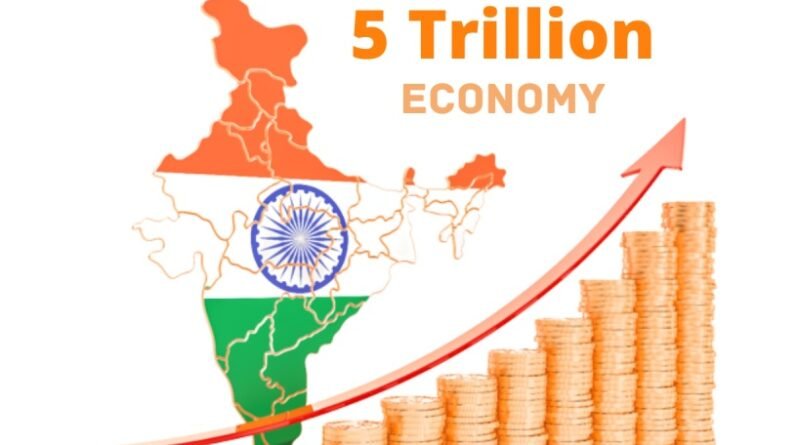India Will Become a $5 Trillion Economy and the Third Largest Economy
India is on the cusp of a significant economic milestone, projected to achieve a $5 trillion economy and secure its position as the world’s third-largest economy. This achievement symbolizes India’s robust economic growth, strategic reforms, and an evolving global presence. Here’s an in-depth look at the factors driving this transformation and what it means for the future.
Economic Trajectory Towards $5 Trillion
India’s journey to a $5 trillion economy has been characterized by a consistent focus on key economic pillars:
- Rapid GDP Growth: India’s GDP growth rate has been among the highest globally, averaging around 6-7% over the past decade. Strategic government initiatives and an expanding private sector have fueled this growth.
- Sectoral Contributions: The services sector, contributing nearly 55% of GDP, remains a powerhouse, driven by IT, financial services, and telecommunications. Manufacturing and agriculture have also seen substantial modernization, contributing to balanced economic growth.
- Reforms and Policies: Policies like GST, the Insolvency and Bankruptcy Code, and Make in India have enhanced business efficiency and global competitiveness. Initiatives such as the Production-Linked Incentive (PLI) scheme attract investments and boost manufacturing.
- Digital Transformation: Digital India has revolutionized the economy, increasing digital transactions and financial inclusion. With a vast smartphone user base and internet penetration, the digital economy is a vital growth driver.
Factors Supporting India’s Rise to the Third Largest Economy
India’s ascent to becoming the world’s third-largest economy by surpassing Germany and Japan is driven by several factors:
- Demographic Dividend: With a median age of around 29 years, India’s youthful population provides a dynamic workforce, fostering innovation and entrepreneurship. This demographic edge supports long-term economic growth.
- Urbanization and Infrastructure: Rapid urbanization, coupled with large-scale infrastructure projects, has spurred economic activity. Investments in smart cities, highways, and railways create jobs and enhance productivity.
- Global Trade and Investments: India’s focus on free trade agreements and its participation in global value chains strengthen its export potential. Foreign direct investment (FDI) inflows have surged, particularly in technology, e-commerce, and renewable energy sectors.
- Green Energy and Sustainability: India’s commitment to renewable energy and sustainability is evident in its ambitious targets for solar and wind energy. Green energy investments position the country as a global leader in sustainable development.
Challenges and Solutions
While India’s economic rise is impressive, challenges remain:
- Income Inequality: Bridging the wealth gap and ensuring inclusive growth require targeted social policies and job creation.
- Skill Development: Equipping the workforce with future-ready skills through education and training programs is critical to harnessing the demographic dividend effectively.
- Global Economic Uncertainty: India must navigate global challenges like inflation, supply chain disruptions, and geopolitical tensions with resilient policies and diversified trade strategies.
The government’s emphasis on structural reforms and innovation addresses these challenges, ensuring sustainable growth.
Implications for the Future
India’s emergence as a $5 trillion economy and the third-largest economy has far-reaching implications:
- Global Influence: India’s economic clout translates into greater geopolitical influence, enabling it to play a more prominent role in global policymaking.
- Improved Living Standards: Economic growth enhances living standards through better healthcare, education, and infrastructure.
- Attractive Investment Destination: A large consumer base and pro-business environment make India a preferred destination for global investors.
Conclusion
India’s trajectory toward becoming a $5 trillion economy and the third-largest global economy is a testament to its resilience, innovation, and reform-oriented approach. With strategic focus and inclusive policies, India is poised to lead the world in economic growth and sustainable development. This achievement marks not just an economic milestone but a defining moment in India’s journey towards global leadership.

